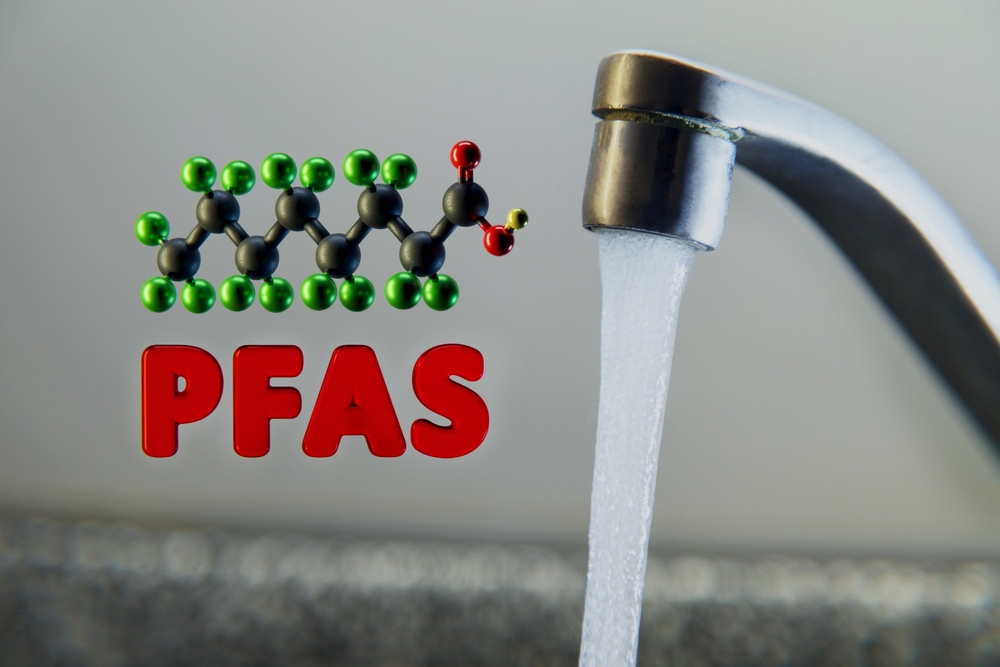Health concerns are growing across the UK after new evidence reveals millions of residents may be drinking water contaminated with toxic “permanent chemicals”.
Following the BBC investigation, water technology company Bluewater issued a stark warning, urging both public awareness and government intervention to address the growing problem of PFAS in tap water.
Bengt Littori, founder and CEO of Blue Water, said: “The findings highlighted by the BBC confirm that safety can no longer be taken for granted, even in countries with advanced water systems from Europe to North America.”
Explanation of PFAS
PFAS (per- and polyfluoroalkyl substances) are a group of over 10,000 manufactured chemicals that were first developed in the 1940s.
It is valued for its resistance to heat, oil, and water and is commonly used in products such as nonstick cookware, waterproof clothing, food packaging, and firefighting foam.
The problem is that PFAS are not easily broken down in nature. That’s why PFAS are called forever chemicals.
Once released into the environment, they accumulate in the soil, waterways, wildlife, and even human blood. Over time, this buildup can pose serious health risks.
Scientific studies have linked PFAS exposure to a variety of medical conditions, including:
Certain types of cancer (especially kidney and testicular) High cholesterol and thyroid disease Liver damage and immune dysfunction Reduced fertility and developmental delays in children
Because of its persistence and toxicity, experts warn that even low-level, long-term exposure can have cumulative and harmful effects.
Surprising findings on PFAS in UK drinking water
Recent findings show that more than six million people in the UK receive water from water supplies contaminated with potentially dangerous levels of PFAS.
Despite the UK’s reputation for advanced water systems, tests by both the BBC and environmental researchers have revealed that these persistent chemicals are slipping through standard treatment processes and making their way into household taps.
The 2024 Bluewater study found alarming levels of PFAS and PFOA in London’s tap water, echoing the Royal Society of Chemistry’s advance warning that the UK was lagging behind other developed countries in regulating these substances.
Many European countries and US states have already set strict limits for PFAS in drinking water, but safe limits are still being debated in the UK.
Is the UK’s water system ready to cope?
Traditional water treatment infrastructure was not designed to remove PFAS.
Although modern filtration can remove many bacteria and metals, these microscopic compounds often pass through unfiltered.
Enforcement notices scrutinized by a BBC investigation found that PFAS levels in some UK water networks were high enough to pose a potential health risk, and the situation could get worse without stricter monitoring.
Environmentalists say the UK government should set binding safety standards and require water companies to monitor PFAS more closely.
Public health advocates also emphasize the need for greater transparency so that consumers can make informed decisions about their drinking water.
Towards a cleaner and safer future
In response to this research, Blue Water is advancing advanced purification technologies designed to remove PFAS, microplastics, and other emerging contaminants directly from water supplies.
The company advocates sustainable solutions that avoid reliance on bottled water, which can leach microplastics and worsen the global waste crisis.
As the science becomes clearer and public awareness increases, the issue of PFAS in drinking water is evolving from a scientific concern to a national policy priority.
Ensuring clean, safe and sustainable water is not just an environmental responsibility, it is a fundamental human right that requires urgent and innovative action.
Source link

